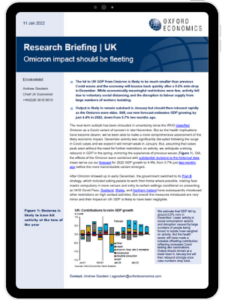Omicron impact should be fleeting for United Kingdom

The hit to UK GDP from Omicron is likely to be much smaller than previous Covid waves and the economy will bounce back quickly after a 0.6% m/m drop in December. While economically meaningful restrictions were few, activity fell due to voluntary social distancing and the disruption to labour supply from large numbers of workers isolating.
What you will learn:
- Output is likely to remain subdued in January but should then rebound rapidly as the Omicron wave ebbs. Still, our new forecast estimates GDP growing by just 4.4% in 2022, down from 5.7% two months ago.
- Nevertheless, a number of high-frequency sources report a marked drop in social consumption activity in December. Most notably, CHAPS data showed a 20ppt decline in debit and credit card spending on social activities during the month.
- Given the relative lack of meaningful restrictions, we attribute the slump in activity to two factors. First, some consumers have adopted a more cautious approach to social consumption given the greater transmissibility of Omicron. Second, the sheer number of cases means large numbers of people were forced to isolate.
Tags:
Related Services

Post
Uncertainty is the biggest threat to Australia’s growth this year
We have downgraded our forecasts for Australia due to the major disruptions to the global economy caused by changes to US trade policy.
Find Out More
Post
Commodity price forecasts cut as tariffs weigh on demand
Most commodity price forecasts are cut due to tariffs except for gold and battery metals, which show resilience amid global market shifts.
Find Out More